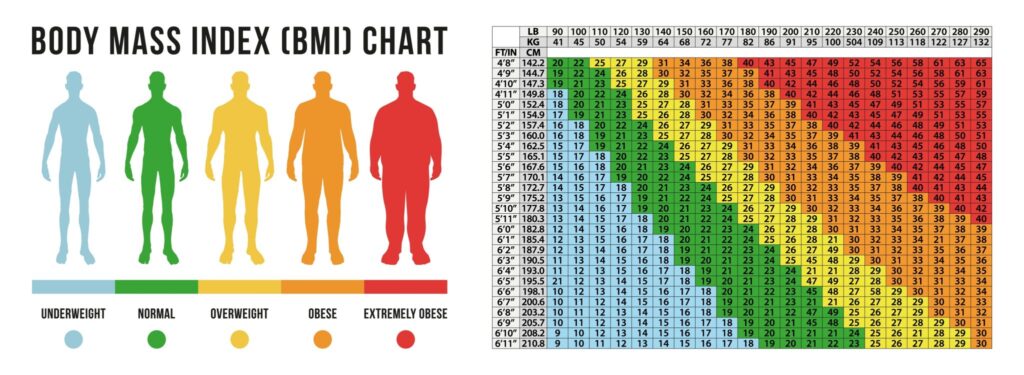Body Mass Index (BMI) Calculator: Find Your Height-Weight Health Score

Where people first go is to the body mass index, or BMI. This is a very easy measure for you to calculate your weight against your height and see if it falls within a healthy range or not. How does it work? Why should you care? Let’s get into everything you need to know about BMI, exactly how to calculate it, and why it is such an important part of keeping your health in check.
What is Body Mass Index (BMI)?
The body mass index is a rough estimation of your height and how much weight a person should be in relation to that height, where it decides whether your weight is within a healthy scope or not. It is by no means an ideal measurement but at least gives a kind of snapshot in terms of finding out the probability of being underweight, of normal weight, overweight, or obese. This is the measurement widely used by healthcare professionals in assessing general weight status for health risk prediction among the population.
Knowing BMI is important because it can provide a simple screening tool to determine if a person’s body weight falls within a healthy range. Though it does not measure body fat, BMI has been shown to correlate with more direct measures of fat, and so it has the potential for clues about risk to conditions like heart disease, diabetes, and high blood pressure.
How to Calculate BMI
Calculating BMI is straightforward. Anyone, regardless of sex and age, does so in the same way. Here is the formula:
scssCopy codeBMI = weight (kg) / height (m)²
It can still be measured by weight in kilograms divided by the square of the height in meters or simply BMI. For the results to be in pounds and inches the number of pounds is multiplied by 703 and divided by the square root of its height.
Example:
- If you are 68 kg and 1.7 meters tall: makefileCopy codeBMI = 68/1.7*1.7= 23.5
A BMI of 23.5 is just in the normal range, which we define below.
BMI Categories: What Your Number Means
Well now that you have your new BMI value, here’s what it will tell you or at least it should. BMI had then been divided in various categories and each category come with its own risks as to health condition.
Underweight BMI
The last group is those people who are underweight, and the BMI value of which is less than 18.5 units. However if the condition advances, it results in malnutrition, osteoporosis and even loss of the immune system. However, the process of putting on weight should be done with certain measure of precaution; in an ideal world we would use natural methods such as increasing out nutritional intake while engaging in vigorous body building exercises.
Normal Weight BMI
Between 18.5 up to 24.9, a normal BMI falls. It implies that you have balanced weights compared to height, and you are less likely to expose yourself to most of the health risks associated with obesity, such as heart disease or diabetes.
Overweight and Obese BMI
- Overweight: 25 to 29.9
- Obese: 30 or higher
A BMI of 25 or higher can suggest overweight or obese status. As BMI is not a perfect marker of health condition, a high BMI does suggest that you are carrying excess weight that may lead to serious problems, such as heart disease and other problems, diabetes, and problems in your joints.
Limitations of BMI
While very useful for being a rough semi-measurement of weight, BMI has its limitations. It does not consider the fat distribution in your body, bone density, and even muscle mass. For example, a football player may show up high on the BMI scale due to muscle mass but have little actual body fat, while another person falling in the ‘normal’ BMI range may have excess pounds of body fat. BMI ignores the variations of a person’s age, gender, or ethnic conditions that may in turn affect his or her body composition.
While BMI is a good starting point, other factors like waist circumference, body fat percentage, and fitness level must not be put aside as well.
Healthy BMI
Maintaining a healthy BMI basically means balance. How do you stay in the healthy range? Here are some tips to keep you in balance:
- Eat a Balanced Diet: Choose whole foods essentially, means to eliminate the processed foods and remain with fruits, vegetables, lean proteins, whole grains, etc.
- Stay Active:Adult men and women should engage in moderate exercising at least 150 minutes per week. It makes no difference whether it is walking, swimming, biking or doing other activities.
- Strength Training: Fitting in some form of resistance training into your daily routine is a good idea. Weight control can be explained as a result of muscle building.
- Get Enough Sleep:Fat can deposit when you fail to get the recommended amount of sleep that you require. Aim for 7-9 hours of good quality night sleep.
- Monitor Portion Sizes: Good foods do not make you gain weight, it’s over eating which does it. Do mindful eating.



